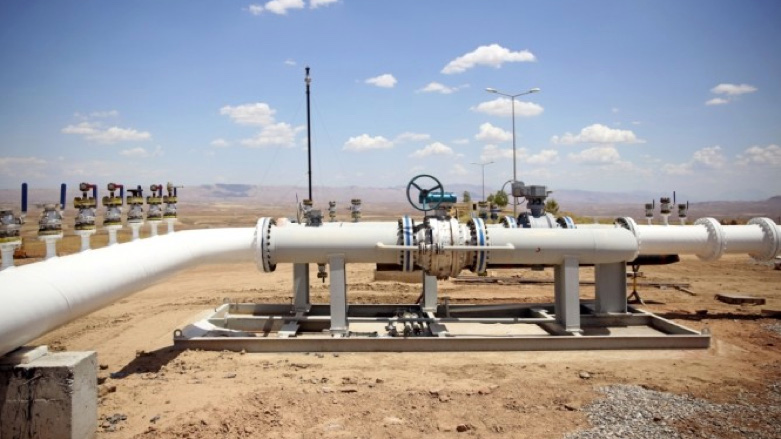U.S. Welcomes Oil Deal between KRG and Federal Government

WASHINGTON DC, United States (Kurdistan 24) – On Tuesday, Erbil and Baghdad announced they had reached an agreement that allows for the resumption of oil exports from the Kurdistan Region, after Masrour Barzani, Prime Minister of the Kurdistan Regional Government (KRG), traveled to Baghdad and met with Iraqi Prime Minister Mohammed Shia Al-Sudani.
Read More: Deal to resume Kurdish oil exports reached
“We welcome this agreement between the central Iraqi government and the KRG,” a State Department Spokesperson told Kurdistan 24, adding, “This outcome is a consequence of the hard work of Iraqi leaders who are putting the needs of the Iraqi citizens first and foremost.”
“Behind the scenes, the U.S. worked very hard” on securing this deal, an informed source explained. "It was all hands on deck, including those in Washington.”
Doubtless, the U.S. can take satisfaction from the relatively amicable relationship between Erbil and Baghdad that facilitated the agreement and which was further advanced by it.
As the Kurdish Prime Minister affirmed in a written statement, after the conclusion of the agreement, “As of today, our relationship with Baghdad is strengthened and we can embark on a new era of trust and cooperation.”
Read More: Our relationship with Baghdad is strengthened: PM Barzani
Similarly, Masoud Barzani, long-time president of the Kurdistan Region before stepping down in 2017, but who remains head of the Kurdistan Democratic Party (KDP), Iraq’s largest Kurdish political party, spoke by phone with the Iraqi Prime Minister. Barzani then issued a statement thanking Sudani and hailing the agreement as a historic step.
Read More: President Masoud Barzani thanks Iraqi Premier for Erbil-Baghdad deal
Last fall, the KDP played a pivotal role in backing Sudani’s bid to become Prime Minister, and Sudani reciprocated by hailing the KDP leader as “one of the pillars of politics in Iraq.”
Read More: Iraqi PM-designate lauds Masoud Barzani—underscoring importance of KDP in Iraqi politics
Thus, one might suggest that it was a combination of U.S. efforts to promote the oil deal, along with the relatively cordial and respectful relations between key political figures in Erbil and Baghdad and their hard work, that helped secure Tuesday’s accord.
Background: Adverse Ruling by International Court of Arbitration
In 2014, the Iraqi government of then-Prime Minister Nuri al-Maliki sued the government of Turkey in the Paris-based International Chamber of Commerce’s International Court of Arbitration (ICC-ICA).
Baghdad complained that Ankara, by exporting oil from the Kurdistan Region, was in violation of a Saddam Hussein-era (1973) agreement that stipulated Baghdad must agree to all oil exports from Iraqi territory.
Of course, Maliki is no longer in office. ISIS soon emerged, seizing one-third of Iraq and threatening both Baghdad and Erbil. Maliki was a sectarian figure, and as a condition of U.S. support against ISIS, the Obama administration demanded his resignation.
Nine years after the suit was first brought, by a prime minister obliged to resign soon thereafter, and using a 40-year-old agreement concluded by a despotic regime, overthrown in the U.S.-led war, the ICC-ICA ruled in favor of Iraq and against Turkey.
Read More: U.S. Calls for Resuming Kurdish Oil Exports—after adverse ruling in nine-year-old arbitration case
To this reporter it seemed a dubious ruling. But a solution has been found, it seems—and in just one week!
Crucial Time for World Energy Supplies
The oil accord between Erbil and Baghdad comes at a critical time for world energy supplies. The U.S. and Europe have responded to Russia’s unprovoked assault on Ukraine with economic sanctions, including on Russia’s energy exports.
The West—the U.S., as well as Europe—radically misread the situation in Russia following the 1991 collapse of the Soviet Union, and particularly after 1999, when Vladimir Putin became prime minister. Western leaders assumed that having shed its communist ideology, Moscow would become like their own countries: a liberal democracy, more or less.
Europe allowed itself to become dependent on relatively cheap energy from Russia. In the forefront of that policy was Germany, as a European Union intelligence source told Kurdistan 24. He held Angela Merkel, German Chancellor from 2005 until 2021, most responsible.
But now, as a result of Western sanctions on Russia, the price of oil on the world market has risen significantly. The U.S. is, thus, keen to maximize energy production from other sources.
As he urged the resumption of Kurdish oil exports, following the ICC-ICA’s decision, Deputy State Department Spokesperson Vedant Patel affirmed last week, “Disruptions to global energy supply would not serve anyone’s interest.”
Tuesday’s oil accord does, indeed, appear to have addressed that problem.
